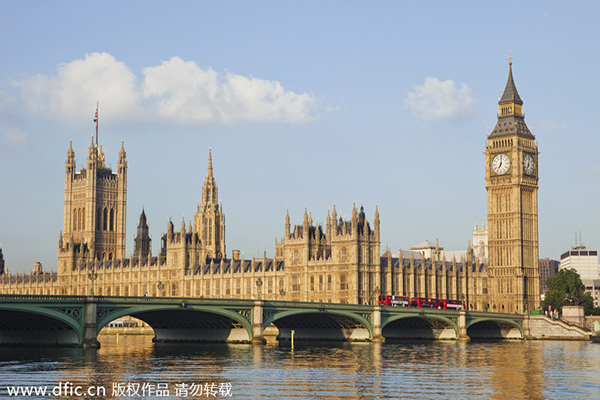UK sets example by joining Belt and Road Initiative
Updated: 2015-10-21 09:17
By Wang Yiwei(chinadaily.com.cn)
|
|||||||||||
 |
|
The landmark Palace of Westminster, Big Ben and Houses of Parliament in London, UK. [Photo/IC] |
In general, there are five ways for the UK to join the Belt and Road Initiative.
First, strategic matchmaking. The UK is not a country along the ancient Silk Road trading routes or covered by the Belt and Road Initiative. However, it has proposed to match the Northern England Revitalization Plan with the initiative. By inviting Chinese President Xi Jinping to visit Manchester, the UK has sent a positive signal that non-member countries can also actively participate in the initiative.
Second, connectivity in five aspects. China has set up offshore yuan clearing center in the UK which will be the first western country to issue yuan-dominated sovereign bonds during President Xi's upcoming visit. As a veteran financial power, the UK plays a critical role in pushing forward the Silk Road Fund and yuan internationalization. Many countries along the Belt and Road are former British colonies which have been adopting the British-style legal system. Therefore, it is of great necessity and profound significance for China and the UK to boost the connectivity in policies, facilities and the people.
Third, development of third-party markets. Unlike the US who achieved hegemony with its alliance system, the UK is a country that used to rule the world. Its governors imposed direct control over the British colonies, including many along the Belt and Road. Therefore, there is tremendous room for economic and security management cooperation. UK's experience, wisdom and creativity, coupled with China's model and technologies, will achieve remarkable results. Compare with China, the UK has a deeper understanding of the third-party markets including legal and insurance services, which is of profound value to boost the Belt and Road Initiative, and strengthen the presence of "Made in China", "Built by China" and "Services from China" along the economic belt and silk road.
Fourth, international capacity cooperation. Britain was the birthplace of industrial revolution, whose infrastructure is aging and yet fully digitized, providing immense room for Sino-UK capacity cooperation. During his visit to the UK, Xi is expected to ink a 240-billion-yuan ($37.8 billion) nuclear deal, leading the trend of international capacity cooperation.
Fifth, joint development of the Maritime Silk Road. The China-EU 2020 Strategic Agenda for Cooperation proposes to enhance exchanges and cooperation between China and Europe in areas including integrated ocean management, marine spatial planning, marine knowledge, ocean observation and monitoring, marine -tech research and development, marine economy, and marine energy. As a global maritime power, the UK can be actively involved in these areas, especially in maritime shipping, logistics, maritime security, marine economy, marine spatial planning, marine resources, data development and sharing, and marine environmental protection. In addition, the UK has a critical say in making international shipping regulations, and can be an important partner of building the Maritime Silk Road. The Sino-UK maritime partnership will strengthen the ties between China and Europe in peace, growth, reform and civilization.
By actively participating in Belt and Road Initiative, the UK has set an example to the rest of the world that open cooperation, harmony and inclusiveness, market operation, and mutual benefits are the way out. It not only embodies the spirit of the Silk Road, but also heralds a new model of globalization.
The author is a part-time researcher at the German Research Center of Tongji University; director of the European Studies Centre, Renmin University of China; and senior researcher at the Chongyang Finance Research Institute. His recent works include "One Belt One Road: Opportunities and Challenges". The views do not necessarily reflect those of China Daily.
Related Stories
Xi's visit to unlock $46 billion in commercial deals 2015-10-20 15:09
Jack Ma enlisted by British PM as business advisor 2015-10-20 10:12
Britain counts on China's infrastructure prowess for economic revival 2015-10-19 09:40
China's extensive reforms benefit whole world 2015-10-16 16:58
British companies looking positively at China's market, reform 2015-10-16 16:33
Today's Top News
Xi tells UK parliament of 'first achievements'
Chinese students out in force to greet President Xi
Xi's visit to unlock $46 billion in commercial deals
Xi touches down in London
UK hailed for closer relations with China
Chinese president leaves for visit to Britain
UK visit to set course for ties, says Xi
Full text of Reuters' Q&A with Chinese President Xi
Hot Topics
Lunar probe , China growth forecasts, Emission rules get tougher, China seen through 'colored lens', International board,
Editor's Picks

|

|

|

|

|

|






